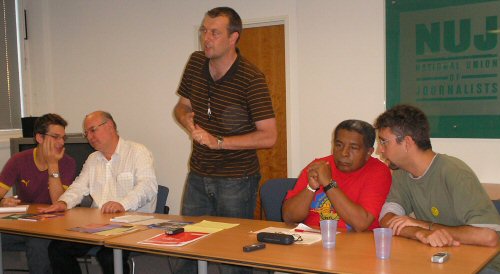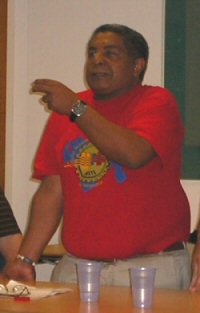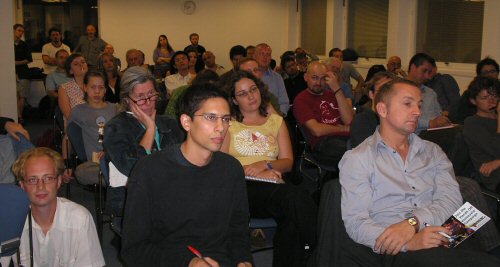On Thursday, September 15, the London branch of the National Union of Journalists, together with the Hands Off Venezuela campaign and Justice for Colombia, organised a meeting with the aim of building trade union solidarity with Venezuelan and Colombian trade union activists. Two leaders of the trade union movement in Venezuela and Colombia were present to explain the struggles of Latin American workers and how unions in the UK can deliver practical solidarity to those who in very different ways are at the forefront of the fight for a better world.
Carlos Rodriguez, General Secretary of the CUT in Colombia, started the meeting by explaining briefly the plight of Colombian trade unionists. He explained that Colombia is the most dangerous country in the world to be a trade unionist. More than 3,000 trade unionists have been killed since 1986. Only last week Luciano Romero, a leading member of the food and beverages union SINTRAINAL, was found dead with his hands tied and stabbed forty times.

This point was confirmed by the chair of the meeting, Jeremy Dear, General Secretary of the NUJ. Jeremy paid a visit to Colombia last year and saw with his own eyes the serious protective measures ordinary trade union militants have to take every time they go out. He recalled how the delegation he was part of went into the CUT offices and had to go through metal and bomb detectors. When they went to a restaurant with leading trade unionists, the Colombian union leaders made the 10-minute journey in a heavily armoured jeep, only to have to leave the restaurant thirty minutes later due to a security alert.
After this, the attention turned to Venezuela. Orlando Chirino, one of the main leaders of the UNT, addressed the audience and sent greetings to all activists building international solidarity. He started by expressing his happiness about the solidarity resolution with Venezuela, which had been passed unanimously the day before at the TUC conference. This, he said, will only strengthen the resolve of the Venezuelan workers, who have been on the move since 1998. Orlando then went on to praise the Hands Off Venezuela campaign, since “the campaign was instrumental in spreading the truth about what is happening in Venezuela”.
Orlando Chirino then gave some background information about recent Venezuelan history. To understand what is happening now, he said, it is necessary to learn about the 1989 Caracazo. Then the Venezuelan people rose up in protest against the government that had introduced IMF policies. A liberal economic package was introduced together with brutal repression, during which 7000 people died or disappeared. From then on, workers were no longer prepared to allow themselves to be robbed in the same way. Orlando elaborated on the failed military rebellion in 1992 staged by Hugo Chavez as a genuine attempt to put an end to the misery in which the Venezuelan people had been living for many years.
 |
Orlando Chirino |
Turning to the trade union situation in Venezuela, Orlando explained about the negative role of the CTV, the former trade union confederation in Venezuela. The CTV, he said, had been part of the regime since 1958. He reminded the audience that one of the first actions of the CTV leadership already back in 1999 was to accept a 10% wage cut for public sector workers and it had always been clear how rotten the structures of the union were. In 1997 this open collaboration with the oligarchy came to a head when the CTV agreed with the then government when it introduced a labour law that did away with several social gains. This clearly indicated that the CTV leaders had decided to become a tool of the oligarchy and imperialism in the region.
In 1998 Hugo Chavez came to power with 60 percent of the votes. One of the first measures of the Chavez government was to hold a referendum about the question of whether there should be a Constituent Assembly or not. As we know now, the overwhelming majority of Venezuelans voted in favour of this assembly. Orlando stressed that this showed that the Venezuelan people clearly supported Chavez and that this was a way of telling the world that they did not want to go back to the past.
In the debate about the constitution all sectors of society took part: women, indigenous people, disabled people, etc. During this process, Orlando said left-wing trade unionists like him had demanded a court case against CTV leaders who had never been elected. There had never been direct elections for the national leadership of the CTV and in many factories the union secretaries had held their positions for 35 years without calling an election. The Constituent Assembly agreed to have a national referendum on the question of direct elections for the CTV leadership. Though this reflected a willingness to do away with undemocratic methods in the union movement, revolutionary trade unionists like Chirino opposed this method, since, he said, this amounted to state interference in the internal affairs of the union movement. However, the referendum went ahead, 70% voted in favour, and in October 2000 trade union elections took place. These were marred by massive fraud, and finally only 48 percent of the ballots were counted, the rest disappearing mysteriously in “accidental” fires. Carlos Ortega was declared the winner of this rigged election and recently the Supreme Court of Justice ruled that the elections were null and void.
After that Orlando spoke about the 49 enabling acts that Chavez passed in 2001 (the land reforms, the fishery reforms and the hydrocarbons law), after which he spoke about the first so-called general “strike” the bosses launched to oust Chavez from power and to destroy the revolution. This was the first act of imperialism, the oligarchy and the trade union bureaucracy, but not the last, since in 2002 the same thing happened all over again. Orlando described how the anti-Chavez coup took place in April 2002 and highlighted the role of FEDECAMARAS, the bosses’ organisation whose leader Carmona became the short-lived president. However, Orlando said, “in 47 hours we broke all records and brought the president back.” The president pardoned the coup plotters, however, and the oligarchy used this opportunity to launch a new lock-out.

In September 2002 an important trade union meeting took place, in which three demands were agreed on: 1) the defence of president Chavez, 2) the defence of the revolution, and 3) imprisonment of the coup plotters. A few months later, in December, ordinary workers and revolutionary activists had to confront the oil “strike” instigated by the bosses and imposed on the ordinary workers. The workers took over the industry in one month and ran this highly complex industry, again by themselves, without the managers.
Orlando emphasised that this was a class war, “and we won the war”. It was clear that the CTV had ceased to be the workers’ organization and had become a tool in the hands of the bosses and the oligarchy. Faced with this situation, there was no alternative but to create a new trade union confederation. Hence the UNT was born, and on April 5, 2003 its founding rally was held.
Orlando characterised the UNT as “independent and autonomous from political parties, the state and the employers”. The UNT is based on solidarity and must support all strikes by the workers, be it in Venezuela, Britain, the Soviet Union or Cuba. This, Orlando said, is because every successful strike strengthens the workers worldwide and weakens the position of the employer class, thus bringing closer the ideal of a socialist world. Hence the UNT is also clearly an internationalist trade union, but it also calls for the abolition of private property. However, since the UNT is a workers’ organisation, all kinds of tendencies are represented within it. “As you might have noticed, I am quite left-wing (laughter) but there is also room for social-democrats and Christian-democrats in the union.”
By way of conclusion, Orlando explained about the gains of the revolution: the improvements in healthcare, education, the various misiones. Finally, after talking about the closed factories being expropriated, and the beginnings of workers’ control, the audience gave Orlando Chirino a big applause, grateful that the chair of the meeting had allowed Orlando to go well over his time.
After the speakers there was room for contributions from the audience. The first speaker from the floor explained how important it was to have a joint meeting about Colombia and Venezuela because you cannot separate the two countries. He had spent his holidays in Latin America and saw that in Bolivia the nationalisation of gas is the main issue amongst the working class. Calls for socialism are not just made by small left groups but are widespread.
Orlando answered questions about the new television station Telesur and about the relationship of the UNT with the Chavez government, while Carlos Rodriguez talked a bit more about the repression against Colombian trade unionists.
Somebody from the audience made the point that it is quite ironic that countries like Venezuela and Cuba were offering help to the richest nation in the world in the wake of hurricane Katrina, which sums up the present situation quite well.
An Iranian comrade explained how they had set up a Hands Off Venezuela group with a website in Persian, and how big an issue Venezuela is amongst activists in Iran.
Finally, Alan Woods, editor of Marxist.com and NUJ member, concluded by recalling Chavez’ own words about him making the mistake to attempt to reconcile capitalism and socialism, and how necessary it was to take the revolution forward in order to avoid another coup.
In briefly touching upon the question what the perspective is for the Venezuelan revolution, Orlando answered that he is utterly convinced that if Venezuela does not go beyond capitalism, the problems of the workers cannot be resolved. In that sense he agrees with president Chavez. However, he concluded that one thing is certainly needed to accomplish that goal: a revolutionary party capable of transforming society for the benefit of mankind.
